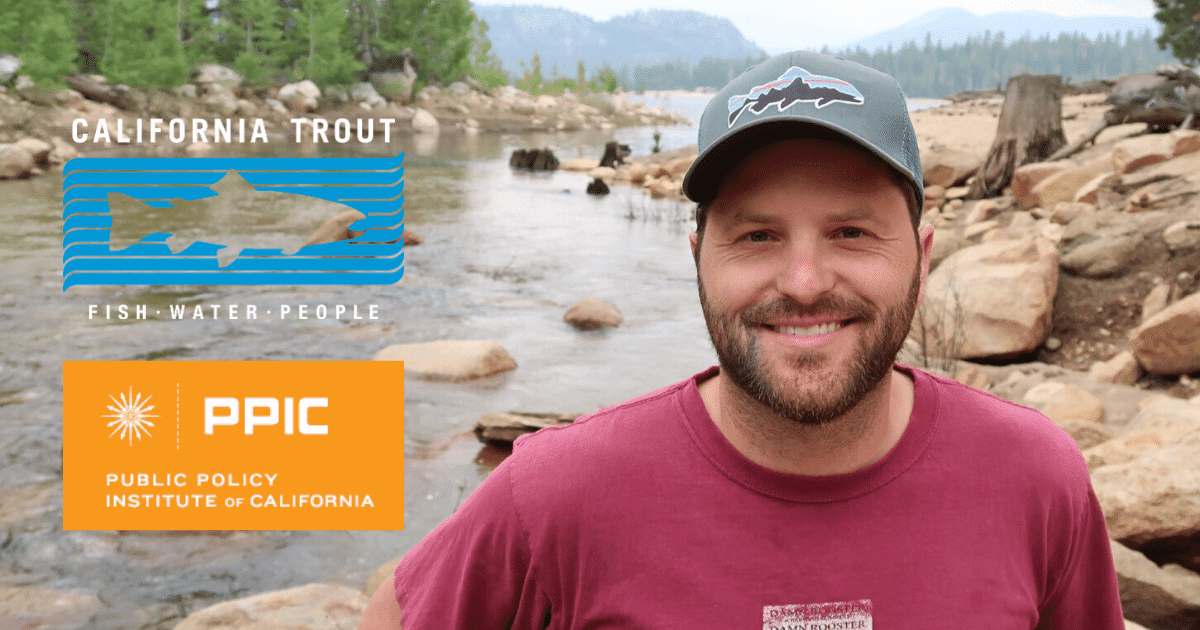Meet Ted Grantham, first PPIC CalTrout Ecosystem Fellow
We are excited to introduce Ted Grantham—a river scientist at UC Berkeley— as the first appointed Public Policy Institute of California (PPIC) CalTrout Ecosystem Fellow! We recently got to know him through an interview. Check out his answers in our latest post. Thanks to the donors that helped us launch this program: Gary Arabian, the Morgan Family Foundation, Nick Graves, John Osterweis, and the Rosenberg Ach Foundation.
Read his latest PPIC blog “Preparing California’s Rivers for a Changing Climate”
Education: B.S. Biological Sciences, Stanford University; Ph.D. Environmental Science, Policy, and Management, U.C. Berkeley
Hometown: Eureka, California
1. How does it feel to be the first CalTrout Ecosystem PPIC Fellow?
I am excited and humbled. For the past several years, I have enjoyed collaborating with CalTrout scientists and the PPIC Water Policy Center. Both organizations do an excellent job of engaging the public and providing decision-makers with timely, science-based information that is aimed at improving water management in California. It’s really an honor to be recognized as the first Fellow of this new program.
2. What will this fellowship allow you to do that you might not have been able to do without it?
At U.C. Berkeley, my research is focused on understanding how human water management practices and climate change affect river ecosystems. However, the knowledge gained from this kind of research only has an impact if it is effectively communicated. Too much of our scientific knowledge never makes it out of journals and into the minds of the public, natural resource agencies, and policy makers. By partnering with PPIC over the next year, I hope to learn how to more effectively communicate science to a broad audience and promote strategies for protecting rivers in the face of climate change.
3. What will you research and might it benefit fish, water, and people?
For the past three years, I have been working with PPIC on a series of reports to improve freshwater ecosystem management in California. One of our key recommendations is to formally establish water allocations for the environment in all of the state’s rivers and streams. In the coming year, I will be focusing in greater depth on this topic, considering what this would actually look like in practice and about creative ways in which we can secure water for fish while also accommodating human water needs.
4. What sparked your interest in researching water-related issues?
I grew up in Humboldt County was lucky to spend time on some of California’s most beautiful rivers, like the Eel, Mattole, and Trinity. Those experiences left an imprint and when I went to college, I was naturally drawn to ecology. When I went on to graduate school at UC Berkeley, I was brought onto a project to investigate how vineyards were affecting salmon and steelhead streams in the Russian River. This was my first experience with the challenges and rewards of conducting policy-relevant research. I jumped at the opportunity to do a post-doc with Peter Moyle at the Center for Watershed Sciences. There, I learned about the broader water challenges facing California and the important role that scientists can play in advancing management and policy. By that time, I was hooked on California water and there was no going back!
5. What advice do you have for people wanting to follow a similar path in science like yours?
My first piece of advice is to seek out people you like to work with and collaborate. Science can be solitary and having good company is key. My second piece of advice is be patient. It can take a frustratingly long time to move research through the process from project conception to proposal development, securing funding and conducting the research, and finally working up and publishing the results. Patience and persistence are essential. But if you do good work on topics that matter to California, your contributions will eventually be recognized and appreciated!
6. What’s your favorite place to fish/visit outdoors?
I’d have to say the Trinity Alps. It’s where I first experienced California’s remote wildlands and caught my first fish. I try to get a backpacking trip in to the Trinities every fall and I’ll be heading there with my pack and rod in a few weeks!





